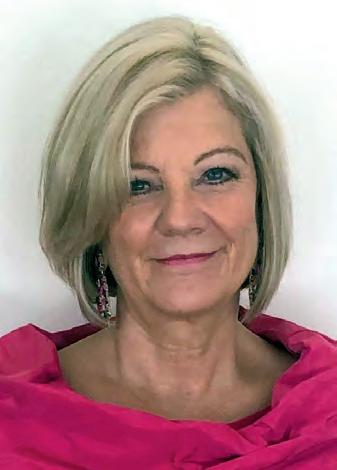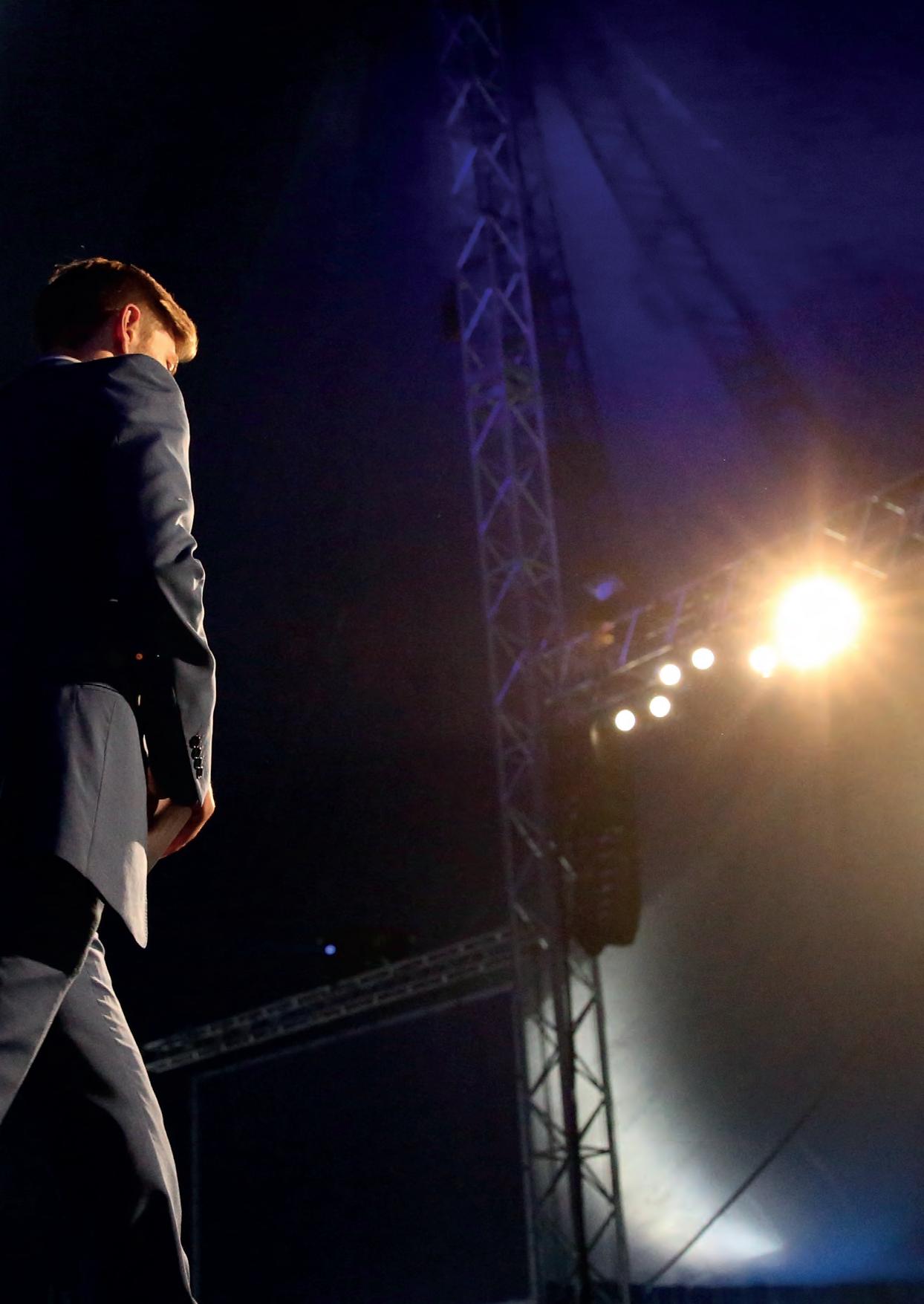
19 minute read
OW Spotlights
What our OWs wish they could have told themselves as teenagers sitting outside Grubbies!
SPOTLIGHTS W
Advertisement
Daisy Crowfoot
(Ap 14)
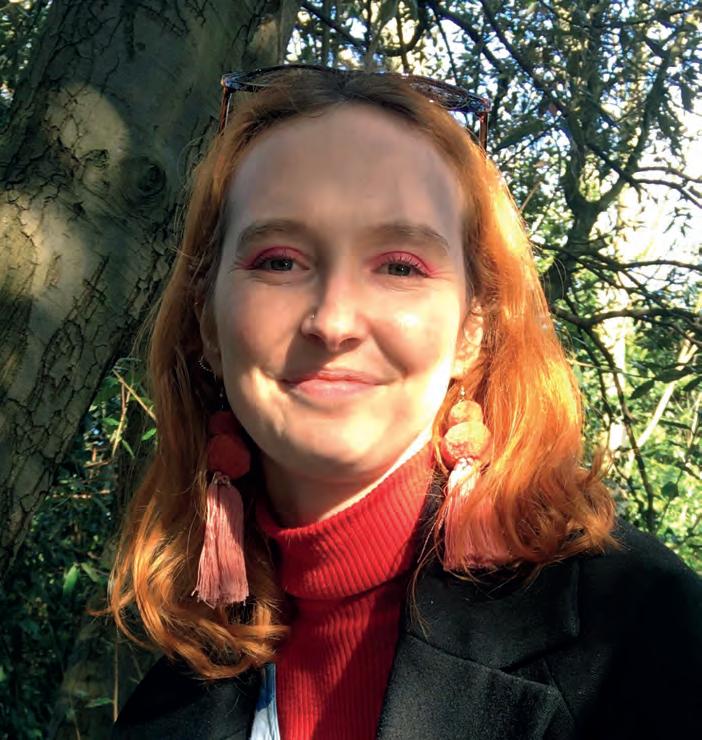
Can you please tell us a bit about yourself? I am Daisy, my pronouns are she/they, and I currently work as the Diversity & Inclusion (D&I) Lead at Energy Saving Trust. My previous role was working in the Equality, Diversity, and Inclusion team at Queen Mary University of London, and before that, I was at Welcome Trust. Outside of work, I am still working to smash the patriarchy but also tend to my many baby houseplants. I love being outdoors/hiking, reading, watching an eclectic mix of TV, cats (!) and occasionally cooking, but mainly eating, yummy vegan food.
What motivated you to apply for your current role? I have always wanted to work in the environmental sector, and care deeply about the climate crisis. So when I saw this opportunity at the Energy Saving Trust, I was excited. The role of D&I Lead is also new at the Energy Saving Trust, which means I have the opportunity to ‘start from scratch’, create an organisational D&I strategy and work with colleagues across the organisation to implement it, which I am really enjoying.
Can you see a positive change in the workplace in relation to diversity and inclusion? Yes, I think there’s been some much-needed change recently with more employers taking equity, diversity and inclusion in the workplace seriously. However, what is important is that efforts to ‘do’ D&I work are not tokenistic and are properly prioritised, resourced and championed by senior leaders. The aim of roles like mine is to effectively embed principles of inclusion, accessibility, and equity across everything that an organisation does, both internally and externally, so that D&I is no longer an ‘add on’, but a core part of an organisations culture. What do you enjoy most about your job? Social justice, accessibility, inclusion, and equity are all things I am passionate about both inside and outside of work, so I feel very lucky to have a job that focuses on these issues. ‘D&I’ is an ever-evolving field and I love that I am always listening to and learning from different lived experiences.
I also really enjoy how collaborative my role is and that I get to work with some brilliant colleagues across the organisation. I am still quite new to the role, having joined in March this year, and am learning so much about the incredibly broad and impactful work that the Energy Saving Trust does to address the climate emergency. It’s great to work in such a mission-led organisation with passionate, knowledgeable and supportive colleagues.
What is the best piece of advice you have ever been given? The most reassuring work-related advice I have been given is that everyone, even those in incredibly senior positions, are making some of it up as they go along. I find it helpful to remember that no one knows all the answers all of the time, and that’s ok.
Do you have a fond memory from your time at Wellington that you would like to share or perhaps a particular teacher that really stood out? Mr Morris and Dr Joanna Seldon were both amazing teachers. Dr Seldon was so thoughtful, introducing me to some beautiful words and the queerness of poetry. Mr Morris was a really fun but also kind and supportive teacher. I learnt a lot from him and feel he helped me to be more confident using my voice and taking up space.
Kai Horstmann
(Hg 00)
Can you please tell us a bit about yourself? I was born and raised in Zimbabwe but educated in England. I started playing professional rugby for Harlequins in 2001 before moving to Worcester Warriors in 2005 and Exeter Chiefs in 2012. I enjoyed silverware successes in the European Cup, LV Cup, Anglo Welsh Cup, and The Premiership. After retiring in 2018, I joined the commercial team at Exeter Chiefs to learn the ‘dark arts’ of elite sport, before making the move into the world of property with Burrington Estates in 2020. I currently head up the commercial sales for Burrington Estates with the development of Winslade Park just outside Exeter at the forefront.
What inspired you to want to want to play Rugby professionally? The 1995 World Cup in South Africa was a pivotal moment. Being a Zimbabwean, I was brought up in awe of the Springboks. Rugby and sport is like a religion in Southern Africa. The troubles South Africa were going through in the early 90’s were enormous. The recently elected president of South Africa Nelson Mandela presenting the Webb Ellis trophy to Francois Pienaar was monumental and a huge factor in inspiring me to want to play pro rugby.
As well as being a professional Rugby player, you have also been involved in multiple business ventures. Can you tell us more about these? I opened a Wine retailer in Cheltenham called Tivoli Wines which I sold a few years ago after six years. I am really pleased to see it’s still going very well and very proud of what we created. The interest in wine stems from my mother buying a farm in the heartland of the wine route in South Africa, Stellenbosch. It’s a huge wine country and it’s very hard not to be absorbed by it. The world of wine is vast and there will always be a market for independents... always support them! A hugely enjoyable industry.
I have also set up a company called Team-i which focuses on the transferable skills in elite sport and helping businesses implement them. Having spent a number of years researching elite sports teams to understand how they achieved their success, Team-i delivers programmes that show how a business can improve their performance by integrating proven strategies and techniques.
What has been your career highlight so far? Winning the Aviva Premiership in 2017 was a great moment. I was lucky enough to win the Hong Kong 7s with England when I was young and that too was absolutely amazing, helped largely by the enormous ex-pat community who filled the stadium.
Where do you see yourself in 10 years’ time? I try not to look too far ahead but my aim is very much to be running my own ship. I see Devon as a long-term home but there is definitely a hunger to experience other countries and cultures. I will always hold Zimbabwe very close to my heart, so who knows!
What is the best piece of advice you have ever been given? Director of Rugby at Exeter Chiefs Rob Baxter is a hugely inspiring figure, and he has many ways and methods to challenge an individual/team. He is a big one for never looking for excuses but rather to look for opportunities in every moment of the day. How can you be better today than you were yesterday? Do you have a fond memory from your time at Wellington that you would like to share or perhaps a particular teacher that really stood out? I have so many fantastic memories... most not for print! I forged friends for life. Sometimes months/years can pass before we meet up again and we simply pick up where we left off. There is a special bond. Sport was a huge part of my time at Wellington, so I have very fond memories of Bigside glory, close fought hockey matches and beating Eton 1st XI in cricket for the first time in 25 years. Speech Day memories were always hugely enjoyable. Whatever your passion, Wellington College would create the platform for you to try and excel at it. I feel incredibly fortunate to have gone to Wellington and will always have the fondest of memories.
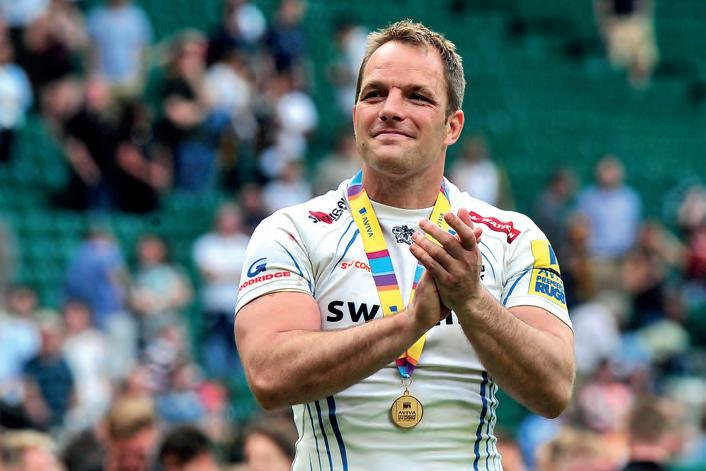
Alison Scott
(Ap 92)
Can you please tell us a bit about yourself? I’m currently a Head of Division in the Prudential Policy Directorate at the Bank of England. I joined the FSA back in 2004, and moved to the Bank of England when they created the Prudential Regulation Authority in 2013. All in all, I’ve worked in banking regulation for 17 years. In my current role I have a broad set of responsibilities from medium term strategy for prudential banking regulation to how the Prudential Regulation Authority meets it secondary competition objective as well as co-chairing our staff disability network.
Given my current role and responsibilities, it may surprise you to read that I am not an economist. I left Wellington (Ap) in 1992 to read Chemical Engineering at Clare College, Cambridge and stayed on to do a PhD. My PhD was sponsored by Unilever and looked at the manufacturing process for washing powder. While I enjoyed my time at Cambridge (I was a choral scholar at Clare), I knew I was not a hard hat, boiler suit wearing kind of person.
Working in finance was a bit of an accident if truth be told. When I was finishing up my PhD I still wasn’t sure what I wanted to do so applied to a number of management consulting companies. When making my final decision, I chose to go and work for Oliver Wyman & Company. It was then 250 professionals globally, focused on financial services. Of all the companies I interviewed with, they were the people I liked the most and if you are going to spend that much time working with people, it is an important consideration. And I think of my background as a real advantage. I don’t think about problems the same way as economists – I’m much more practical in the way I think. And that diversity of thought has helped me be successful in my career.
I would now describe myself as a poacher turned gamekeeper. I really like the public sector feel of working for the Bank of England, that sense of making a difference. I get to work with really smart people and the problems are varied and challenging. No two days are the same. Outside work, I have a wide set of interests. I’m the mum of two girls – my oldest started at Wellington last September. I make costumes for my youngest daughter’s dance school and sew hospital gowns for sick children through a charity called Pyjama Fairies and I’ve recently become a trustee of the Old Wellingtonian Society Charitable Trusts.
How have you found working in a mainly male dominated industry? When I was at Wellington there were only 50 girls in the school, with 25 each in the ixth form and Lower Sixth. I was the only girl in my maths set, one of two in chemistry and one of three in physics. So I would say I now work in a much less male dominated environment than my days at school! It did, however, prepare me well to hold my own.
What has been your career highlight so far? For those who follow the activities of the Bank of England, one of the things the Bank has been known for in recent years is its annual concurrent stress test. I was part of the original team that designed, implemented and ran the stress tests. Delivering such a high profile financial stability tool was a privilege and real highlight for me.
What is the best piece of advice you have ever been given? I once heard Martha Lane Fox speak – she asked the audience to ask themselves if what they do matters. That has really stayed with me and helped ground me – I really do feel that the work I do makes a difference.
What advice would you give to young OWs? Make sure you are passionate about the work you do. You’ll spend the largest part of your life working, so make it worthwhile. Be happy to get up in the morning and go to work knowing you make a difference. Don’t limit yourself to what you know – skills are eminently transferrable. Do you have a fond memory from your time at Wellington that you would like to share or perhaps a particular teacher that really stood out? A couple of things stand out for me – perhaps more a reflection on the current times. The first is the two choir tours I went on while I was at Wellington – to Czechoslovakia (as it was then) and to Italy (Florence and Siena). They were fantastic trips and I’m only sorry that the current Wellington students aren’t getting the same opportunities.
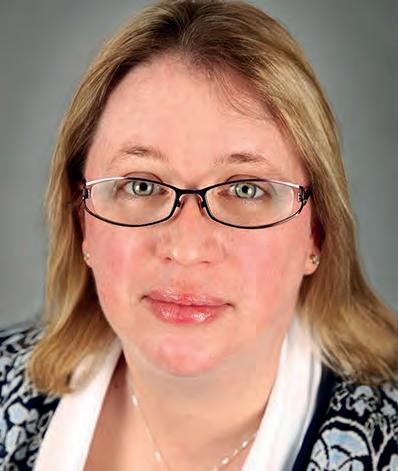
My very last day at Wellington I had one exam to go. I think about six of us sat the exam up in the maths block and, while we were toiling away, the school year finished. When we finally emerged, everyone had gone home! So, a somewhat surreal ending to my time at Wellington.
Richard Wollocombe
(C 86)
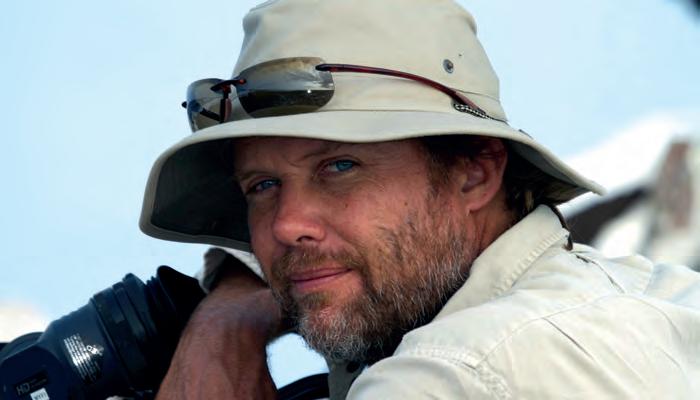
Can you please tell us a bit about yourself? I spent most of my early childhood living in various countries in South America and was an overseas border at Wellington while my parents lived in Colombia. While I was in university I went on a family holiday to Galápagos and it had such an impact on me that after finishing my degree I decided to become a scuba diving instructor and headed to Galápagos where I spent five years as a National Park guide. My arrival there coincided with the first commercial live-aboard dive boat and so I spent the first years pioneer dive guiding which is a euphemism for the blind leading the blind! It was an exciting time and as Galápagos gained a reputation as a world class diving destination, I had the fortune to guide numerous photographers and film makers who helped me on my path to a career in wildlife filmmaking.
What inspired you to become a wildlife cinematographer? Undoubtedly my years guiding in Galápagos were extremely inspirational. I saw first-hand the positive impact Galápagos had on the people. I felt that sharing my experiences in Galápagos and other places in the world with a wider audience was a good way to draw attention to the wonder of nature but also the fragility of it. But on another level and while I was still at Wellington, my parent’s house in Colombia was burgled and they lost many of their cherished possessions. But the one loss they could never reconcile was the theft of most of my father’s cine 8 film archive of the family life. It made me realise that of all the things we most cherish, it is the memories in whatever form they physically manifest, that are priceless. So what inspired me in part to become a wildlife cinematographer was the desire not only to share the inspiring beauty and wonder of the natural world with a wide audience but to preserve the memory of it knowing that so much of what is alive today may be gone tomorrow.
What has been your career highlight so far? It was gratifying to see how much attention the snake vs marine iguana sequence received that my colleagues and I filmed for Planet Earth II. It was wonderful to see the sequence go viral and to know that the series gained huge popularity among young people. But there have been many highlights that were more important to me. For instance, it was otherworldly to film industrial scale purse seine fishing from inside the net. It was extremely intense to witness the vast school of wild tuna fish encircled and gradually trapped into a seething mass of panic stricken fish. Filming the fishes’ perspective, the fishing boat felt more like an extraordinarily sophisticated animal with a gigantic mouth, controlled by a brain that was connected to a system of ocean sensors and satellite communications technology that could know where and when the fish were at certain times and locations. How could nature compete with this new ‘species’? Just witnessing this event was a shock to me and I felt a huge sense of satisfaction to know that I could share the very rare perspective with so many other people and hopefully move audiences to realise the impact our species is having on the planet.
What are you working on at the minute? I am working on an independent production to make a feature film on Galápagos. We are in the fundraising stages of production, and it will largely be a non-profit film to raise awareness of the ocean and emotionally connect people with it.
What advice would you give young OWs interested in wildlife cinematography? I found it very useful to learn stills photography before I touched a film camera or video camera. There is also no replacement for filming as much as you can. I made my first films by deconstructing other films and picking them apart, and this taught me a lot about filming also. Photography or cinematography is a skill that you never stop developing. As a wildlife cinematographer, it is helpful to spend as much time in nature as possible, sharpening your observation skills and connecting to the natural world. We have atrophied our sensibilities to nature and being able to do justice to the natural world is as much about understanding and feeling your subject as it is about knowing how to film it.
What is the best piece of advice you have ever been given? My parents said; ‘Always get back in the saddle when you fall off your horse’. I’ve done plenty of falling and so this advice has been quite useful!
Do you have a fond memory from your time at Wellington that you would like to share or perhaps a particular teacher that really stood out? I really enjoyed my time at Wellington. The boarding school life and culture provided a great foundation for later in life. I learnt to become independent very early and it gave me the confidence to choose a path in life that I may have had second thoughts about had I not had the confidence to pursue my dream.
Angela Woolnough
(Ap 77)
Can you please tell us a bit about yourself? I joined the Sixth Form at Wellington College in 1975 when the school first opened its doors to girls – 7 girls and 770 boys. This was a ground-breaking experiment for Wellington which had been a boys’ school for 120 years. I remember feeling petrified and overwhelmed during the first term. After that we soon settled into A level studies and made new friends. My favourite time was during the long hot summer of 1976 – secret pub jaunts, illicit parties and group swimming/picnics all led to frequent rule breaking! My favourite teachers were Mr Ramage and Mr Ridley who both taught me English Literature. They were brilliant academics, incredibly inspiring and left a lasting impact on me.
So now I am 61 – a solicitor, tribunal judge and assistant coroner. I live in Worcestershire and have three grown up sons.
Why did you choose a career in law? I had absolutely no idea who I was or what I wanted to do in life at age 18. I chose a law degree because it seemed to embody three things which strongly appealed to me – forging relationships with colleagues and clients, problem solving, and working within a structured legal framework. It was only later, as a practising solicitor, that I also realised how important it was to be able to read, research, analyse, draft and advise on lengthy complex documents and also to be able to work under pressure.
My career in law was not all plain sailing. With an average law degree from a middle ranked university, I went on to law college in Guildford and then failed the legal practice course. I re-took the exams, passed and then met the next hurdle – finding a training contract. After hundreds of applications to firms in London and a few unsuccessful interviews, I finally struck lucky and in 1983 was accepted by Hempsons Solicitors in Covent Garden, who specialised in medico-legal work. I worked my socks off, qualified and became a salaried partner in 1987. I know how hard it is for prospective solicitors to find a training contract these days even with gold standard qualifications and relevant work experience. The best advice I can give you now is not to give up, promote as many networking contacts as you can and develop other interests or hobbies which make you stand out from the crowd.
My career changed in the late 1990s. By then I had three small children and my priorities changed. I left practice and became a magistrate and law lecturer as both fitted into school term time. After a divorce in 2011 I decided to go back into practice as a solicitor. Hurdle number 3. Age 51 – not easy.
I joined a criminal practice in Worcester – and worked unpaid initially whilst I sat the criminal litigation accreditation exams. It was difficult juggling work, study, raising three sons, renovating a Georgian house and attending night call outs to Worcester police station to represent clients for interviews under caution!
Then in 2013, I applied to become a tribunal judge in the social entitlement chamber (social security benefits) – and after a long rigorous process I was appointed. More training followed before I began to sit in courts all over the Midlands with other tribunal members hearing appeals. I gave up practice as a solicitor and focused purely on the tribunal work which continues to this day. In 2015 I was appointed an assistant coroner, hearing inquests in the East Midlands. Challenging but rewarding work in another jurisdiction.
What advice would I give to you if you are considering a career in law? You can see from my own career experience that life often requires a degree of flexibility with the ability to adapt to new circumstances. The benefit of law is that it offers a variety of paths which you can follow as your future life changes. I never had any career goal of becoming a tribunal judge/coroner but somehow all those years spent working in medico-legal work, teaching and criminal law led naturally into roles which require this experience. And I now really enjoy the judicial work. I believe that the two key skills which you will need for a career in law are the abilities to communicate effectively – both orally and in writing. Perhaps I have Messrs Ramage and Ridley to thank for that!
Before you decide on a career in law you will undoubtedly research it thoroughly beforehand and ideally get some work experience in a firm or in chambers. Wellington College has an excellent OW law careers opportunity group. They hold various events over the year and OW lawyers are on hand to offer advice and guidance. I hope you enjoy your career in law as much as I have – Good Luck!
